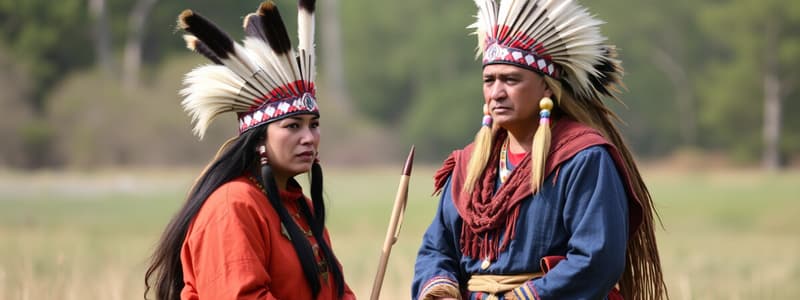Podcast
Questions and Answers
What were the primary reasons that the Adena-Hopewell culture had to move to fresh land?
What were the primary reasons that the Adena-Hopewell culture had to move to fresh land?
- Exhaustion of hunting grounds and overfarming (correct)
- Desire for new trade routes
- Conflict with neighboring tribes
- Natural disasters impacting their settlements
Which event is associated with the beginning of the Protestant Reformation in the early 1500s?
Which event is associated with the beginning of the Protestant Reformation in the early 1500s?
- The launch of the Portuguese slave trade
- The unification of Isabella and Ferdinand (correct)
- The signing of the Magna Carta
- The establishment of the Iroquois Confederation
What technological improvements during the 15th and 16th centuries greatly influenced European exploration?
What technological improvements during the 15th and 16th centuries greatly influenced European exploration?
- Invention of the mechanical clock
- Development of cartography and navigation tools (correct)
- Introduction of wireless communication
- Advancements in steam engine technology
How did the formation of nation-states in Europe influence monarchs during the period of exploration?
How did the formation of nation-states in Europe influence monarchs during the period of exploration?
Which of the following regions was primarily inhabited by descendants of the Woodland mound builders?
Which of the following regions was primarily inhabited by descendants of the Woodland mound builders?
What significant impact did the Columbian Exchange have on the native population of the Americas?
What significant impact did the Columbian Exchange have on the native population of the Americas?
Which event established Portugal's claims to Brazil and Spain's claims to the rest of the Americas?
Which event established Portugal's claims to Brazil and Spain's claims to the rest of the Americas?
What was the purpose of the encomienda system implemented by Spain in the Americas?
What was the purpose of the encomienda system implemented by Spain in the Americas?
What was the impact of Spanish exploration and conquest on the wealth of Spain?
What was the impact of Spanish exploration and conquest on the wealth of Spain?
What system required the Spanish to pay a tax on enslaved people brought from West Africa?
What system required the Spanish to pay a tax on enslaved people brought from West Africa?
Flashcards are hidden until you start studying
Study Notes
Northeast Settlements
- Soil exhaustion from hunting and farming methods of the Adena-Hopewell culture forced communities to seek new land.
- The Iroquois Confederation, a political alliance of five tribes, emerged in the Mohawk Valley, New York, becoming a powerful entity from the 16th century through the American Revolution.
Atlantic Seaboard Settlements
- Settlements extended from Southern New Jersey to Florida, composed of descendants from Woodland mound builders.
- Rivers and the Atlantic Ocean served as vital food sources for these communities.
Key Concept 1.2: Columbian Exchange
- Contact between Europeans, Native Americans, and Africans led to significant cultural, social, and political transformations.
- European expansion into the Americas fueled intense competition and transformation within European societies.
European Exploration
- Technological advancements during the 15th and 16th centuries included the use of gunpowder, sailing compass, improved shipbuilding, and mapmaking.
- The invention of the printing press facilitated the spread of knowledge throughout Europe.
Religious Conflict
- The union of Isabella and Ferdinand with Columbus’s voyages sparked hope for Catholic Europeans.
- In the early 1500s, the Protestant Reformation saw divisions within Christianity as various factions sought to spread their religions globally.
Expanding Trade and Slave Trade
- Portugal began trading enslaved individuals from West Africa in the 15th century for labor on sugar plantations.
Development of Nation-States
- Fragmentation of multiethnic empires into nation-states with shared cultures marked a shift in European politics, where monarchs relied on trade and the church for authority.
The Columbian Exchange and Spanish Empire
- European diets expanded with the introduction of crops like beans, corn, and tobacco, while new diseases like smallpox devastated Native populations.
- The Treaty of Tordesillas in 1493 demarcated territorial claims between Spain and Portugal, resulting in territorial division in the Americas.
Spanish Exploration and Conquest
- Conquest by Hernan Cortes and Francisco Pizarro established Spanish dominance, with silver and gold exports boosting Spain’s wealth by 500%.
- The encomienda system granted land and Native labor to Spaniards, while the asiento system required taxes on enslaved individuals imported from Africa.
French and Dutch Claims
- French exploration was hindered by internal conflicts; their first permanent settlement was led by Samuel de Champlain, which initiated Mississippi River exploration.
- The Dutch West India Company managed areas around the Hudson River for economic interests.
Interactions Between Europeans and Native Americans
- Spanish policies devastated Native populations through forced labor and established a rigid class system defined by ethnicity.
- Bartolomé de Las Casas advocated for Native rights, pushing for reforms in Spanish colonial policy.
- English settlers initially coexisted with Native Americans but increasingly encroached on land, leading to conflict.
- French settlers viewed Native Americans as allies and built trading relationships without the intent of displacement.
Native American Reactions
- Diverse tribal identities complicated a unified response to European encroachment, leading to individual alliances or migrations in search of safety.
Causation of European Exploration and Settlement
- Social Causes: Desire to convert Native Americans sparked cultural conflicts, discrimination, and the establishment of social hierarchies based on race. Efforts to convert led to the Atlantic slave trade and the implementation of systems like encomienda.
- Political Causes: Expansion pushed Native Americans westward, leading to demographic disasters from diseases and conquest of civilizations like the Aztecs and Incas. Treaties and policies dictated territorial claims and governance.
- Economic Causes: Economic motivations drove French, Spanish, and Dutch expansions, including the control of fur trade and extraction of wealth from colonies. The discovery of precious metals heightened competition among European nations in the Americas.
Studying That Suits You
Use AI to generate personalized quizzes and flashcards to suit your learning preferences.




